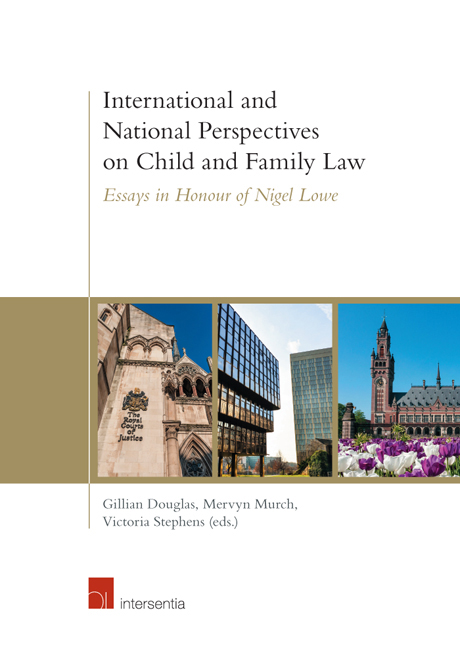Book contents
- Frontmatter
- Foreword
- Acknowledgements
- Contents
- List of Cases
- List of Contributors
- Introduction: Nigel Vaughan Lowe: An Appreciation
- Part I Family and Child Law in England and Wales
- The Supreme Court and Family Law
- The Development of Parent–Child Relationships in Family Law: The Cascade of Change
- Commitment-Based Parenting: Parental Responsibility in English Law
- Rights Children Should Not Have
- Empirical Research on Adoption of Children from Care
- Pathways to Adoption: From Long and Winding Road to Obstacle Course?
- Child Abuse and Public Inquiry Methodologies
- Lowe and the Inherent Jurisdiction
- Wards of Court
- Part II International Family Law
- Part III The Future for Family and Child Law
The Development of Parent–Child Relationships in Family Law: The Cascade of Change
from Part I - Family and Child Law in England and Wales
Published online by Cambridge University Press: 12 October 2018
- Frontmatter
- Foreword
- Acknowledgements
- Contents
- List of Cases
- List of Contributors
- Introduction: Nigel Vaughan Lowe: An Appreciation
- Part I Family and Child Law in England and Wales
- The Supreme Court and Family Law
- The Development of Parent–Child Relationships in Family Law: The Cascade of Change
- Commitment-Based Parenting: Parental Responsibility in English Law
- Rights Children Should Not Have
- Empirical Research on Adoption of Children from Care
- Pathways to Adoption: From Long and Winding Road to Obstacle Course?
- Child Abuse and Public Inquiry Methodologies
- Lowe and the Inherent Jurisdiction
- Wards of Court
- Part II International Family Law
- Part III The Future for Family and Child Law
Summary
INTRODUCTION
This chapter presents reflections on the rapidity of recent changes to the law related to parent – child relationships following a number of years of writing on changes in the law related to parenthood. The title of the chapter has been borrowed from Sachs LJ who, in the 1970 case of Hewer v Bryant, evocatively referred to ‘a cascade of legislation’ responsible for changing the nature of the law related to children in the twentieth century. Many of the changes he was alluding to featured heavily in my undergraduate modules on family law. This was in no small part because I was privileged to be taught by Professor Nigel Lowe. I have two vivid memories of the experience. One is the image of him leaning intensely over the table and barking ‘authority?!’ in response to almost any student comment (an exercise in scholarly rigour that I sorely needed but, in truth, have yet to master). The other is of a moment in a large lecture theatre, in which he related the facts and summarised the judgment from the case of C v C. Sitting in the front row, I signalled my disapproval of Glidewell LJ's assertion of the innate superiority of heterosexual parenting arrangements. Perhaps I did this less quietly than I ought to have done because I attracted sufficient attention to elicit a response. A brief exchange concluded with Nigel commenting that this might be an interesting area for research. He must bear some responsibility for the fact that, not long aft erwards, I commenced a PhD on the topic of lesbian parenting and the law.
As my doctorate approached its end, the law moved on apace. In the years following its completion I wrote on the parenthood provisions of the Human Fertilisation and Embryology Act 2008, as well as on common law developments connected with calls to recognise multiple parenting arrangements involving lesbian women and known sperm donors. In reflecting on all this for the purposes of the present piece, my thoughts turned to broader questions about the direction of and drivers behind developments in the law related to parent – child relationships.
- Type
- Chapter
- Information
- International and National Perspectives on Child and Family LawEssays in Honour of Nigel Lowe, pp. 23 - 38Publisher: IntersentiaPrint publication year: 2018



